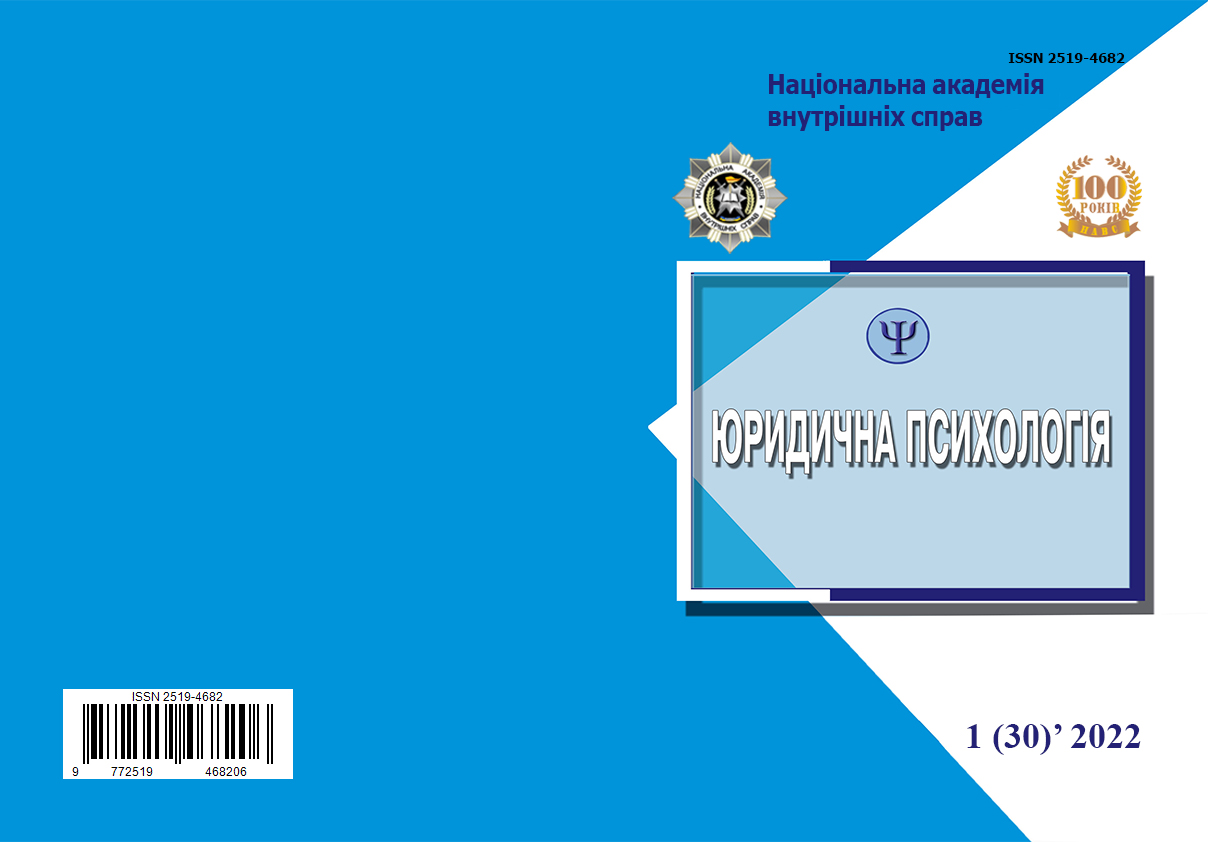Psychological Basis of Involving Employees of the Expert Service of the Ministry of Internal Affairs of Ukraine in the Pre-Trial Investigation
Abstract
The purpose of the study is to consider the conceptual foundations of psychocorrection of addictive behavior of minors. Methodology. The methodological tools have been a general theory of social deviations, based on both differentiation and integration of existing knowledge in different fields. On this basis, the essence of addictive behavior, which is expressed in the desire to escape the reality by artificially changing their mental state, has been determined. It results from impaired adaptation to new environmental conditions, deviates from social norms and does not meet generally accepted standards of behavior, biochemical, social and individual psychological factors. The scientific novelty of the article is to highlight the principles of psychocorrection of addictive behavior, taking into account the analysis of its factors and mechanisms. The necessity of application of integrative models of psychocorrection with priority of psychological correction of causal type approximately to age and individual features of the client is substantiated. Conclusions. The complexity of the factors of addictive behavior in the combination of biological and social factors require the definition of conceptual foundations in the development of psychocorrectional influences, first of all, the leading principles of psychological correction. Conceptual principles of psychocorrection involve the use of various psychotherapeutic approaches aimed at restructuring the personality. Strategies for psychocorrection of adolescent addictive behavior should be selected individually, depending on what becomes a priority in determining the causes of interpersonal conflict. The influence of the environment is crucial in this process. The prospect of further research is the development of psycho-correctional programs for various types of addictive behavior of adolescents.
Keywords: Expert Service of the Ministry of Internal Affairs of Ukraine; psychological foundations; pre-trial investigation; interaction; involvement of employees.
Downloads
References
Пиріг І. В., Бідняк Г. С. Використання спеціальних знань на досудовому розслідуванні : навч. посіб. Дніпро : Дніпроп. держ. ун-т внутр. справ, 2019. 140 с.
Кузьмічов В. С., Чорноус Ю. М. Слідча діяльність: характеристика та напрями удосконалення : монографія. Київ : ЗАТ НІЧЛАВА, 2005. 448 с.
Семенов В. В. Спеціальні знання в розслідуванні злочинів : дис. ... канд. юрид. наук : 12.00.09. Київ, 2006. 212 с.
Ковальов В. В., Лук’янчиков Б. Є. Взаємодія слідчого та експерта-криміналіста в процесі розслідування. Актуальні проблеми взаємодії судових та правоохоронних органів у процесі реалізації завдань кримінального судочинства : матеріали Всеукр. наук.-практ. конф. : у 2 ч. Запоріжжя : Юрид. ін-т МВС України, 2003. Ч. ІІ. 2003. С. 61–65.
Чорноус Ю. М. Особливості взаємодії при розслідуванні злочинів міжнародного характеру. Вісник Луганського державного університету внутрішніх справ імені Е. О. Дідоренка. 2012. Вип. 1. С. 231–238. URL: http:// nbuv.gov.ua/UJRN/Vlduvs_2012_1_29.
Юрченко А. М., Гарбовський Л. А., Башта І. І. Взаємодія слідчого з оперативними підрозділами під час кримінального провадження: актуальні проблеми та шляхи їх вирішення : монографія. Ірпінь : [б.в.], 204 с. URL: http://ir.nusta.edu.ua/jspui/bitstream/doc/3800/1/4006_IR.pdf 2018. doi: https://doi.org/10.32837/pyuv.v0i38.903.
Балан М. І. Взаємодія слідчого та інших суб’єктів кримінального провадження при розслідуванні порушень державного кордону України. Підприємництво, господарство і право. 2020. № 3. С. 290–295. doi: https:10.32849/2663-5313/2020.3.48.
Негребецький В. В. Роль психології підозрюваного під час слідчого експерименту. Підприємництво, господарство і право. 2020. № 3. С. 307–311. doi: https://doi.org/10.32849/2663-5313/2020.3.51.
Кримінально-процесуальний кодекс України : Закон УРСР від 28 груд. 1960 р. № 1001-05. URL: http://zakon2.rada.gov.ua/laws/show/1001-05.
Кримінальний процесуальний кодекс України : Закон України від 13 квіт. 2012 р. № 4651-VI. URL: http://zakon4.rada.gov.ua/laws/show/4651-17.
Гевко В. В. Використання непроцесуальної інформації під час доказування у стадії попереднього розслідування : автореф. дис ... канд. юрид. наук : 12.00.09. Київ, 1996. 21 с.
Шепітько В. Ю. Криміналістика. Енциклопедичний словник (українсько-російський і російсько-український) / за ред. В. Я. Тація. Харків : Право, 2001. 560 с.
Бондар Г. Ю. Правове забезпечення взаємодії слідчих правоохоронних відомств у кримінальному судочинстві України : дис. ... канд. юрид. наук : 12.00.09. Харків, 2004. 230 с.
Цимбал Г. П. Взаємодія як умова забезпечення виявлення і розслідування податкових злочинів : дис. ... канд. юрид. наук: 12.00.09. Ірпінь, 2005. 223 с.
Весельський В. К. Організаційні основи розслідування злочинів. Взаємодія слідчого зі спеціалістами експертних підрозділів ОВС у ході дослідчої перевірки: проблемні питання : матеріали наук.-практ. семінару (Київ, 23 груд. 2011 р.). Київ : Нац. акад. внутр. справ, 2012. С. 40–43.
Азаров Ю. І. Особливості взаємодії слідчого з експертом (спеціалістом) на початковому етапі досудового розслідування. Юридична наука. 2014. № 10. С. 87–96. URL: http://nbuv.gov.ua/UJRN/jnn_2014_10_11.
Марушев А. Д. Принципи взаємодії слідчого з учасниками досудового слідства. Теорія та практика судової експертизи і криміналістики. 2011. Вип. 11. С. 133–138.
Abstract views: 169 PDF Downloads: 133
- Authors reserve the right to authorship of their own work and transfer to the magazine the right of the first publication of this work under the terms of the Creative Commons Attribution License, which allows other persons to freely distribute published work with mandatory reference to authors of the original work and the first publication of an article in this magazine.
- Authors have the right to enter into separate additional agreements on non-exclusive dissemination of the work in the form in which it was published in the journal (for example, to post an article in the institution's repository or to publish as part of a monograph), provided that the link to the first publication of the work in this journal is maintained.
- The journal's policy allows and encourages the posting of articles by authors on the Internet (for example, in electronic storehouses of institutions or on personal websites), both before the submission of this manuscript to the editorial office and during its editorial processing, as this contributes to the creation of a productive scientific discussion and positively affects the efficiency and dynamics of citing the published work.




